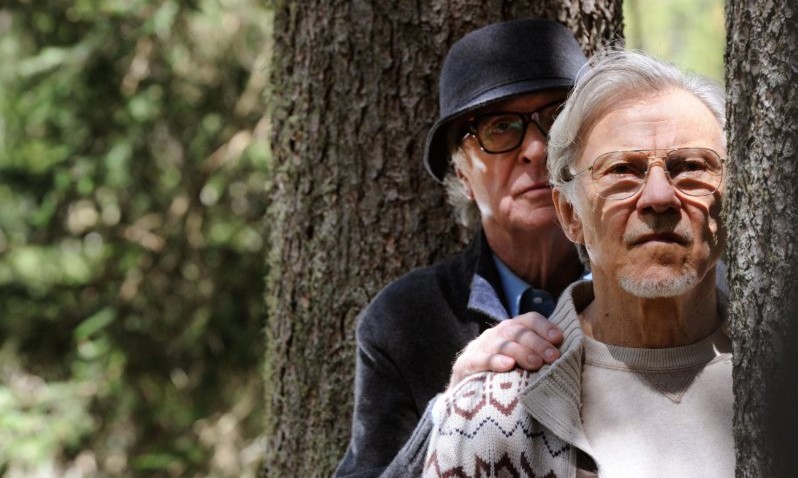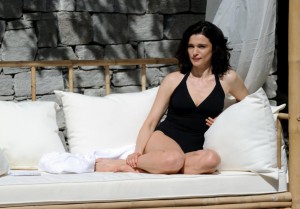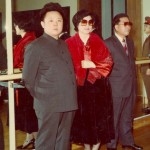Joyce Glasser reviews Youth (January 29, 2016)
For 14 years the Italian actor Tony Servillo was the star of Writer/Director Paolo Sorrentino’s pivotal films, from his debut, One Man Up, to the film that made his name, The Consequences of Love, to the masterpiece that awarded him the Academy Award for Best Foreign Film in 2013, The Great Beauty.
Like The Consequences of Love, Sorrentino’s second English language film, Youth, is set in an upscale spa hotel in the Swiss Alps, where, in place of Servillo, we have two English speaking actors: 82-year-old Michael Caine and 76-year-old Harvey Keitel, playing two septuagenarians friends on holiday, reminiscing about life and love.
The film begins with one of Sorrentino’s signature camera moves, as it swirls around a female singer entertaining guests at the exclusive alpine spa hotel (The main location is the 19th century Waldhaus Flims Mountain Report and Spa).
The film ends in London with Fred Ballinger (Caine) conducting his most cherished song, Simple Song, at a special performance for Prince Phillip’s birthday. Throughout, there is music, with Mark Kozelek and Paloma Faith appearing as themselves. Cows and birds in the wildflower-studded fields also contribute as retired composer Fred Ballinger conducts a piece that could be called ‘Cow bells and bird wing flutter’
Fred is vacationing with his friend of sixty years, Mick Boyle (Keitel). Mick is a film maker trying to revive his career with a team of young writers. Fred is accompanied by his 40-something daughter, Lena (Rachel Weisz), with whom, oddly, he shares a room.
As Lena tells a besotted professional climber and instructor (Robert Seethaler), she has two jobs: daughter and secretary to her father.
Her job as a wife has just ended with news that her husband has run off with the much younger pop singer Paloma Faith. Lena is hysterical but Fred cannot help. Even his attempt to shield her from the rumoured reason for her husband’s abrupt departure backfires.
Various quirky characters and satirized real celebrities, populate the hotel, including a grossly overweight former football star (assumed to be Diego Maradona), a Miss Universe and a masseuse with braces who dances. An actor (Paul Dano) preparing for a new movie, chats to Fred, lamenting that, despite all his great work, people still remember him for playing a cute robot.
Only gradually, after a trip to his wife’s care home in Venice, do we understand his real reasons. His angry refusal; his separation from his wife, once a famous singer; the tirade of reproaches from Lena about what a bad father and husband he was, and his subsequent decision to conduct the song for another singer form the character arch of the film for Fred.
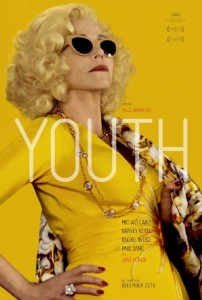 Mick’s sketchier story is connected to the film he hopes will be his ‘testament’ and he is counting on the name Brenda Morel (Jane Fonda) to get financing. The two have a history and ‘Mick is certain Brenda will take the part both to work with him, and, as he reckons with his adoring neophytes, ‘Where else is she going to get a part like this at her age?’
Mick’s sketchier story is connected to the film he hopes will be his ‘testament’ and he is counting on the name Brenda Morel (Jane Fonda) to get financing. The two have a history and ‘Mick is certain Brenda will take the part both to work with him, and, as he reckons with his adoring neophytes, ‘Where else is she going to get a part like this at her age?’
When Morel, a heavily made up force of nature in dated attire, lands in the hotel on a whistle stop visit, she declines the offer. She tells Mick that she has accepted a 3-year television contract to play an alcoholic grandmother who has a heart attack – Sorrentino clearly shares our condemnation of ageism in the media. ‘It’s idiotic’, she says, referring to the role, but it will pay for her son’s rehab and other bills.
When Mick turns nasty, she retaliates: ‘you’re going on 80 and getting worse with age, she tells him. ‘The last three films you made were shit. You don’t see the world anymore because all you see is death.’ She is telling him the truth out of love and because he is a great director.
These themes of past glory, now frozen in time, are interwoven with conversations between Fred and Mick about a girl they both lusted after 60 years and juxtaposed with daily updates on their inability to urinate. In arguably the best scene in the film, the two men, wrinkled and vulnerable, are chatting in a large hot tub when suddenly, in comes Miss Universe: a tall, well endowed, statuesque beauty. Stark naked, she prances through the water and stretches out opposite the two gaping men who think they are dreaming. They clearly still feel a thrill, but she is oblivious to their presence.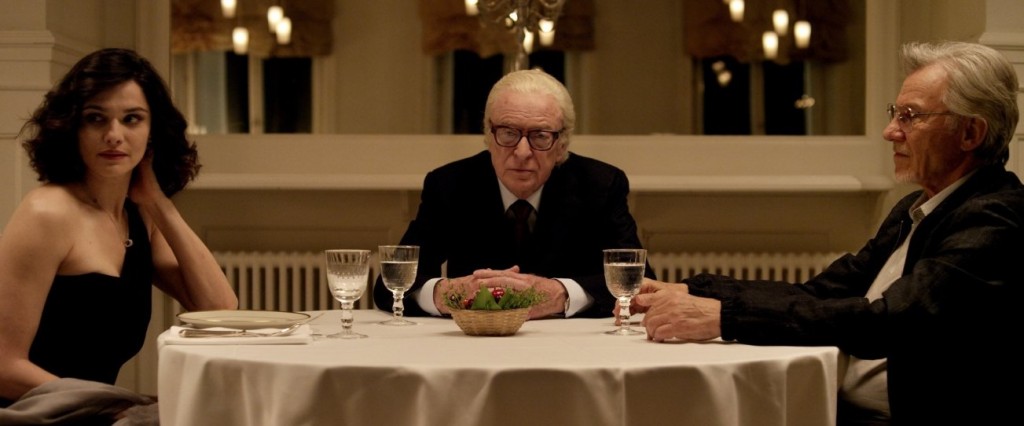
There is, then, much to admire in Youth, including music by David Lang. Simple Song, sung by coloratura soprano Sumi Jo, is in the running for the Best Song Academy Award. Sadly, though, too much of the film feels like a tattered shadow of The Great Beauty, reinvigorated by the incomparable cinematography of Sorrentino’s regular cinematographer, Luca Bigazzi, Several impressionistic scenes and sequences, with echoes of Fellini, are pure self–indulgence, leading to meandering longeurs absent from the well-constructed The Great Beauty.
There are potentially powerful images (a floating meditating priest) and lines of dialogue that might be profound in a dramatic context, but lose their impact in their random delivery. Too much of Youth is constructed from a series of unearned climaxes, like a comedian so eager for a reaction, that he delivers the punch line without bothering with the rest of the joke. While Caine’s strong performance is moving, the film is less emotional that it should be. That said, if Simple Song is to your taste, the big set piece at the end will bring tears to your eyes.

